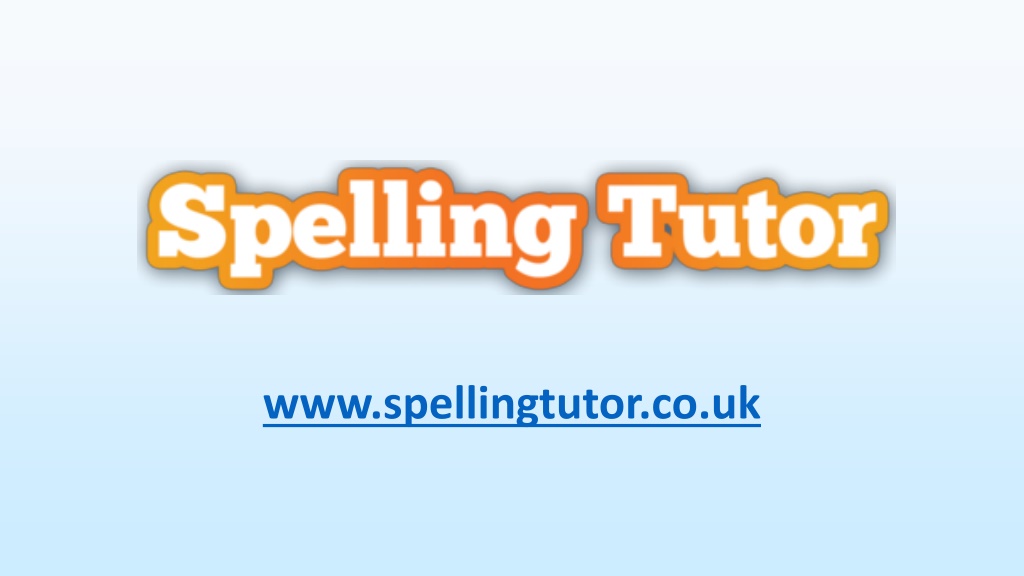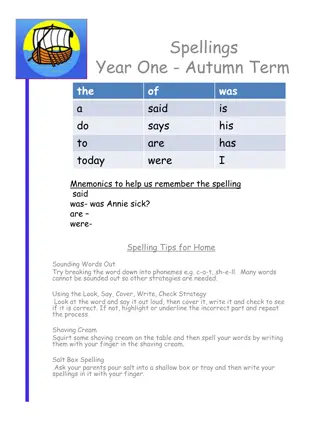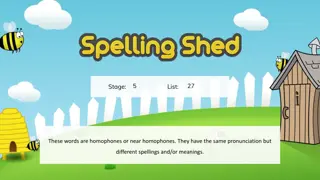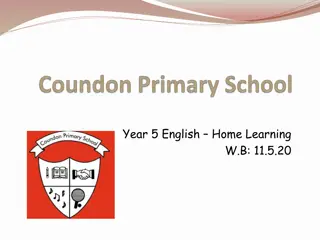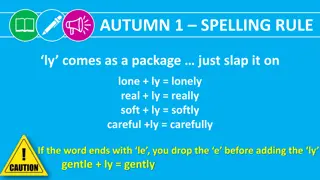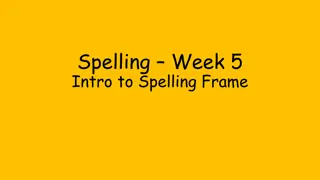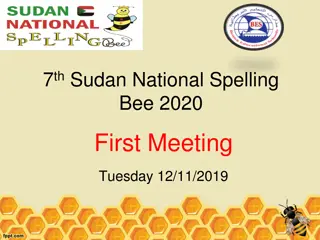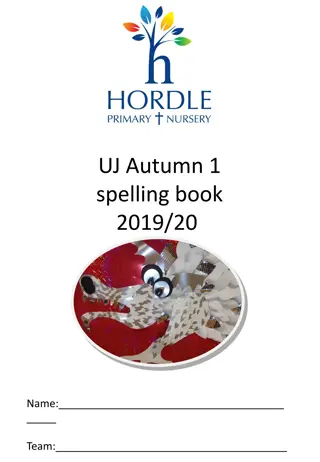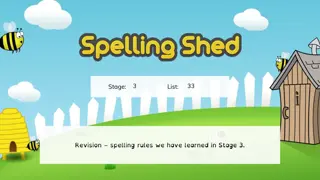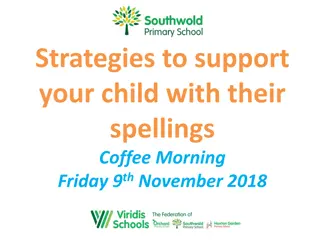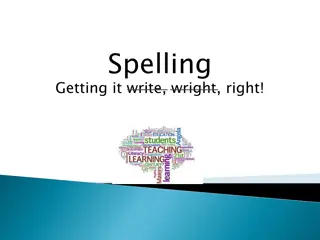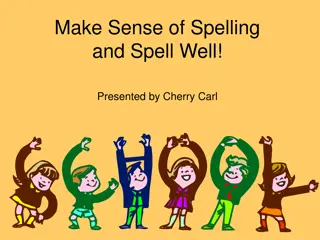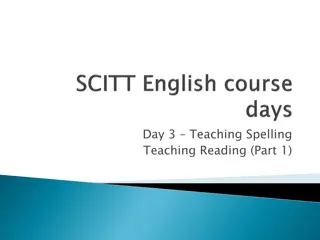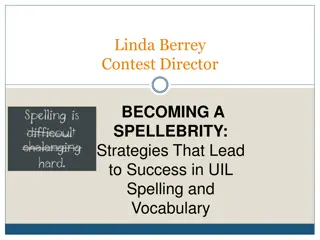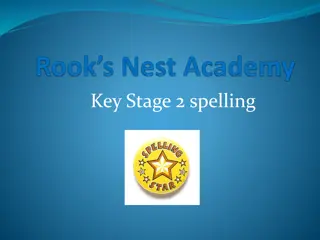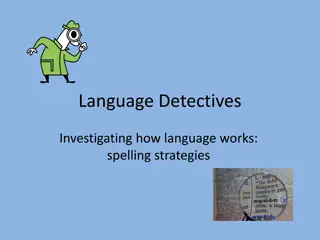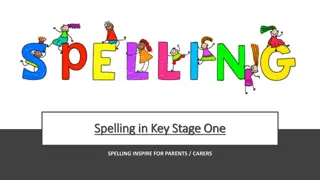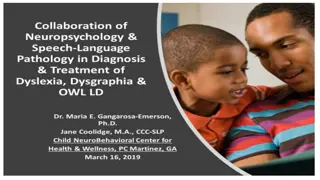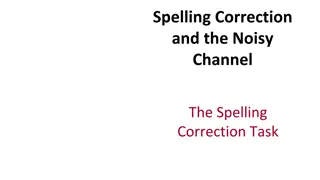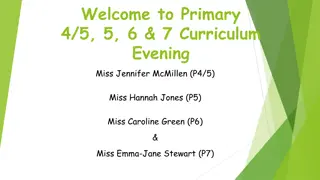Effective Learning Strategies for Spelling Improvement
Spelling Tutor is a specialized program designed for students with SEN/SpLD/Dyslexia focusing on teaching the first 1,000 most frequently used words and emphasizing memory exercises for spelling retention. The program avoids explicit phonics instruction and rules to encourage fluent writing. Learn how spaced repetition enhances long-term memory retention and the importance of visual recognition in spelling success.
- Spelling improvement
- Special education
- Memory exercises
- Effective learning strategies
- Spaced repetition
Download Presentation

Please find below an Image/Link to download the presentation.
The content on the website is provided AS IS for your information and personal use only. It may not be sold, licensed, or shared on other websites without obtaining consent from the author. Download presentation by click this link. If you encounter any issues during the download, it is possible that the publisher has removed the file from their server.
E N D
Presentation Transcript
Spelling Tutor Spelling Tutor Is a Learn to Spell program for students with SEN / SpLD / Dyslexia It assumes the child has great difficulty in learning to spell! It is not recommended for children with no learning difficulties because of the enormous amount of repetition built into it.
Words Covered Words Covered Spelling Tutor teaches the first 1,000 words ( the 1,000 most frequently used words) Which are the majority of words we use in everyday writing. Plus all the words and letter strings in the new 2014 Spelling Curriculum
Phonics Phonics a ai ay a-e ey eigh Spelling tutor doesn t explicitly teach phonics because: Children should have already had lots of phonics instructions. Phonics can only help you spell phonetically plausibly not correctly
Homophones Homophones Or indeed lots of spellings may be correct: Made Maid Hear Here Hare Hair Way Weigh
Spelling Rules Spelling Rules It only teaches a handful of rules: Because if a pupil can learn via rules, they re probably not an extremely bad speller Because we want the pupil to write fluently and not be thinking about rules Because the majority of rules have exceptions to them
So, how do we learn to spell? So, how do we learn to spell? Normally we write the word and see if it looks right. The only way you can get good at spelling is by remembering each letter, or knowing what a word looks like. Therefore learning to spell is a memory exercise.
Memorising Stuff Memorising Stuff Lots of research shows that the most effective way to retain information is through Spaced Repetition (also called Spaced Rehearsal and many other names) This means repeating the information, over and over, with larger and larger gaps in between repetitions. This is the most effective way to transfer stuff from short term to long term memory.
Spelling Tutor Spelling Tutor Spelling Tutor teaches the first 1,000 words via spaced repetition. These words are grouped into mini stories which are read by the pupil and then dictated by the computer If you get a word wrong it is placed on your personal list of words to learn and tested over and over again If you get it right it is never tested again.
Writing not Typing Writing not Typing The most effective way to learn spellings is through writing them not typing them. So Spelling Tutor asks the students to write the sentences and words And then to mark their own work
Multisensory Multisensory This sentence is dictated. The pupil writes the sentence. Then marks their own work.
Student marks their own work Student marks their own work By marking their own work they take total ownership of their learning They don t click next till they re ready They don t have an adult telling them they re wrong They can memorise the word however they want to.
SPaG SPaG It contains a variety of SPaG lessons.
Homophones Homophones And lots of homophone lessons.
Teacher Involvement Teacher Involvement The intervention requires no planning or work by the teacher. All they have to do is select the initial start level Pupils and Teachers can also add their own words to their list.
